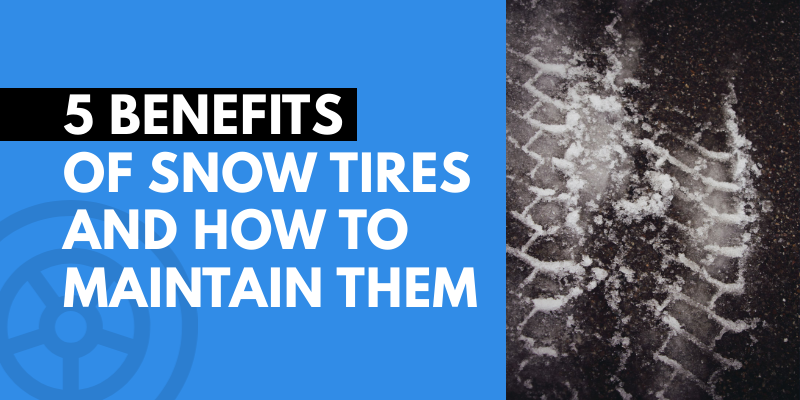As April turns the corner in Muskegon, the last bits of winter driving in the 2022/2023 season have come to a close. Feeling your vehicle lose control on the road due to snow/ice is one of the scariest things that happens to Michigan drivers (although some folks like us find it exciting sometimes!) Of course, you deal with it – because you have places to be. But wouldn’t it be nice if there was an alternative? There is. They’re called snow tires, and we help install them for many customers every winter season.
Snow Tires Versus All-Season Tires 
Most people think that all-season tires are the answer to all their tire needs, regardless of the weather. However, snow tires were made for a reason. All-season tires sound great on the surface, after all, you won’t have to change them out when summer comes right? But what if we told you that all-season tires aren’t actually made for winter performance?
Don’t get us wrong, all-season tires are better than nothing in the winter, but when it comes down to it, they aren’t the best tire option on the market, especially if you live in the snowy realm of Muskegon, Michigan. If you are interested in true performance, snow tires are the way to go.
Benefits

Snow tires are made of a rubber compound, tread pattern, and structure that is designed to provide key performance benefits. In contrast to all-season tires, snow tires are designed to take into account the temperature and road conditions in winter weather. Because of these design features, snow tires will have better flexibility and traction as well as steering, brake, and hydroplaning control than all-season tires.
Flexibility
Snow tires are made of a softer rubber compound than all-season tires. In cold temperatures, the rubber on the treads will harden, which reduces the flexibility of the tire and, in turn, loses traction. Snow tires account for the impact of Michigan temperatures and reduce traction loss by up to 50% according to All-State.
Traction
Traction is the number one concern during winter driving in Muskegon. Snow tires have unique tread patterns, increased tread depth, and biting edges. These features, combined with the flexible rubber compound, provide the best possible traction on any type of snow, sleet, or ice at any temperature.
Steering Control
When you increase the amount of traction that you can get on a slick surface, you also increase the control that you have. No matter how great your tires are, chances are you will still find yourself sliding around on Muskegon roads at some point, especially on the bridges.
Snow tires have considered that too! When you slide around on snow tires, the biting edges and unique tire patterns allow you to maintain a level of steering control that will keep you on the road and in your own lane when it matters most!
Braking Control
Nothing is more terrifying in the winter than coming up to a busy intersection and feeling your brakes slipping because your tires can’t get a grip. With snow tires, there is less chance of losing control while braking. In fact, most drivers report a shorter stopping distance in the ice/snow when using snow tires versus all-season tires.
Hydroplaning Reduction
Finally, all of these features combine to provide the most important benefit of all: hydroplaning reduction. Hydroplaning can occur when a vehicle hits standing water or slush at higher speeds. The tire loses contact with the surface of the road and all control of the vehicle is lost. Snow tires account for this as much as possible by providing adequate traction and flexibility to maintain contact, even at higher speeds.
Maintenance

As with any tires facing the pothole challenges of Muskegon (and Michigan in general), snow tires require a bit of regular maintenance. Below are a few tips for regular snow tire maintenance. However, we recommend contacting our Muskegon auto repair shop for any serious quality concerns.
Balance
Keeping your tires balanced is important, especially when considering traction. That is why it is vital to replace all four tires when installing snow tires, even if you only have 2-wheel drive. By installing four snow tires, you ensure that the tires are fully equipped to handle any road conditions, and neither end of the vehicle is getting too much/too little grip.
Pressure
All tires need to maintain the proper air pressure to ensure quality performance. However, air pressure is especially important in snow tires. As the temperature changes, so does the air pressure in the tires, which can impact the traction and control. Check your air pressure regularly in the winter – especially when the temperature changes by 10 degrees or more.
Time For A Change?
You may have guessed already, snow tires should be taken off in the summer months. Because they have a softer rubber compound, they can sustain an increased amount of wear on the tread when used in higher temperatures. In general, snow tires should be installed around November and December, and removed sometime between March and April.
So, what tires are good for summer? We’d recommend performance tires in the summer over all-season tires, as many performance tires are designed for use on both wet and dry roads at higher temperatures. If you’re unsure of how to choose between summer performance vs. all-season tires, shoot us a call and we can help you decide!
The Bottom Line
Snow tires are a useful tool that can help even the most casual drivers navigate the wintry conditions they encounter on both snowy and dry roads. In Muskegon, where snow is a common occurrence over winter, they’re well worth the cost. Contact our shop if you have questions or concerns about tire repair.




